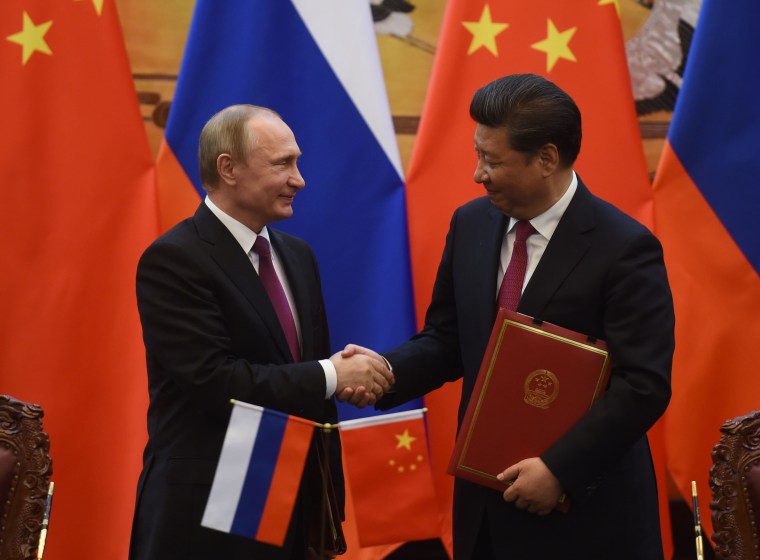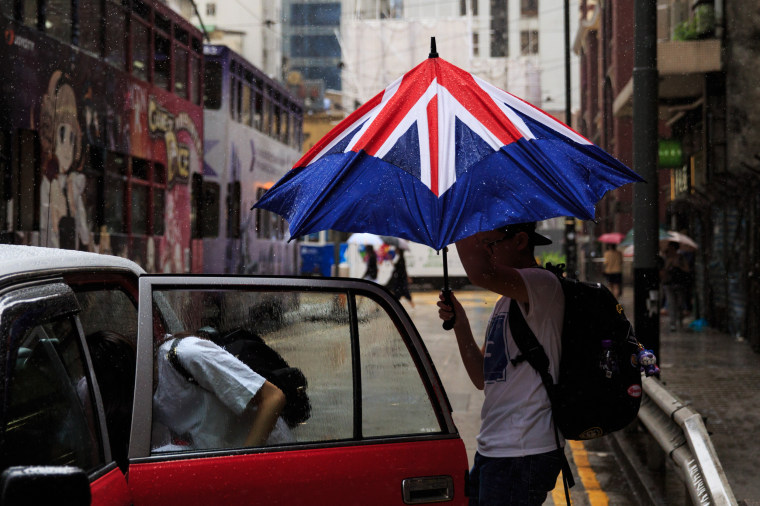Voters were warned that Brexit would be a political boon for Britain’s traditional foes and rivals, and some early responses in Russia and China — glee, sarcasm and schadenfreude — suggest those predictions were right.
Prime Minister David Cameron said during the referendum campaign that Russian President Vladimir Putin would be “happy” if the U.K. decided to quit the European Union. His foreign secretary, Philip Hammond, said that “the only country who would like us to leave the EU is Russia.”
Voters ignored those warnings, and Hammond’s Russian counterpart Sergey Lavrov blamed Cameron’s defeat on his “arrogance and superficial attitude to solving pivotal matters for [his] own country and Europe as a whole.”
Putin said after last month’s shock result that Britons voted to leave the EU because they “want to be more independent” and are not happy about their security, EU migration policies or the financial support they must give to smaller, weaker member states.
"Nobody wants to feed and subsidize weaker economies, maintain other states, entire nations,” Putin said.
In China, where President Xi Jinping urged Britain to stay in the EU to avoid harming the global economy, analysts beginning to see a silver lining in Brexit: a weakened Europe.
“Without restraint from the EU, it will be easier for Britain to forge bilateral trade agreements with China,“ said Wang Yiwei, dean of the Center for European Studies at Renmin University in Beijing.
"This division of Europe is somewhat beneficial for Russia"
“In turn, without Britain, EU will draw closer to the Eurasian economy,” he added, favoring China’s long-term strategy of playing a pivotal role in growing Asia-Europe economic ties.
A strengthened position against Europe would boost China’s competitive trade position against the United States, Wang believes.
In Russia, analysts predicted other nations would follow Britain out of the EU and drew parallels between Brexit and votes by Russian speakers in Ukraine who were encouraged by Moscow to break away from the government in Kiev.
"Brits are a bold people, they are first to leave, but there is already a line [of more nations] behind them,” Dmitry Kiselyov, an outspoken television personality said during his popular Channel One show.
The pro-Russia separatist leader of the breakaway Donetsk region of Ukraine, Alexander Zakharchenko, told the local news agency: “Britain did what we had done two years ago.”
He added: “Luckily for Britain, no one is sending planes there, they are not called separatists and so on, and that's why I want to congratulate the people of Britain."
Others in Moscow hope Brexit will lead to a thaw in relations with London and the lifting of EU sanctions that have damaged Russia’s economy.
“Without Great Britain there won't be anyone in the EU left to stand up for sanctions against us so vigorously," Moscow Mayor Sergei Sobyanin, who once headed Putin’s administration and serves as one of the leaders of the ruling United Russia party, tweeted.

Alexey Mukhin, of the Moscow-based Center for Political Information, and a pro-Kremlin analyst, told NBC News: “This division of Europe is somewhat beneficial for Russia. Russia can effectively interact with individual European nations, but can’t do it with Brussels.”
In an op-ed published by the Washington Post, former U.S. ambassador to Russia Michael McFaul, who now teaches at Stanford University, wrote: “Europe is now weakening as Russia, its allies and its multilateral organizations are consolidating, even adding new members. Putin, of course, did not cause the Brexit vote, but he and his foreign policy objectives stand to gain enormously from it.”
Putin’s return to the presidency in 2012 signaled the Kremlin’s political tilt to the isolationist, anti-Western and nationalist right — and no one seemed more excited about Brexit than Russia’s neo-cons and nationalists.
"British people made the right choice," said Vladimir Zhirinovsky, leader of LDPR, Russia's most outspoken nationalist party. "Rural, provincial, working-class Britain said 'no' to the union created by financial mafia, globalists and others."
In both Moscow and Beijing there was a sense of schadenfreude — with some citing Brexit as a vindication of their political culture compared to the EU.
“There may be in part a psychological reaction here: when our Soviet Union broke up, you celebrated; now your own union is breaking up, and we will not be sorry,” wrote Alexander Baunov, a Russia expert from the Carnegie Moscow think tank.
Brexit indeed reminded Russians about the psychological and economic trauma that followed the Soviet collapse.
"Democracy is good but not when it is out of control"
Although it was “unreasonable to draw direct parallels,” the United Kingdom is now going through a “turbulent, confusing and unpredictable period” similar to the 1991 Soviet dissolution, Kremlin spokesman Dmitry Peskov said last week.
Russia “has gone through the collapse of the Soviet Union and many generations clearly remember the period of the Soviet collapse, that period of uncertainty,” Peskov told Russian media.
The turmoil of Brexit “will deepen our confidence” in China’s political system, Lan Hengmin wrote in an opinion piece for China’s state-run Economic Herald.
“The Communist Party’s leadership in politics and our socialist economic system have enabled us to control various conflicts and optimize the various economic factors,” he wrote. “Western countries say China is not democratic enough … but Western democracy has a fatal weakness in that in order to gain popularity, those in power give way to short-term interests and sacrifice the long-term interests of the people.”

Wang Yiwei, the expert with Beijing’s Renmin University, said Brexit showed that “democracy can be kidnapped by populism and nationalism.”
“Democracy is good but not when it is out of control,” he told NBC News.
Blogger Zhan Hao echoed that sentiment, saying: “In political logic at least, China’s system is better than that of the West.”
Aside from the weakness of the pound sterling currency, will Brexit make a practical difference to Russians or Chinese?
“Not at all,” said Marina Travkova, a family psychologist from Moscow whose 15-year-old son Daniil is enrolled in a private British school. "Russians need a [British] visa anyway, schooling is a matter of affordability, and for the time being the pound has gotten cheaper, which comes in handy," she told NBC News.